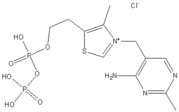Ten patients on dialysis (9 hemodialysis) with altered mental status, the cause of which was unidentified after an initial work-up, were studied. Manifestations included confusion, chorea, acute visual loss, rapidly progressive dementia, myoclonus, convulsions, and coma. Of 7 patients in whom serum thiamine concentrations were measured, all had subnormal levels. All 10 patients received an intravenous injection of 200 mg of thiamine, followed by 100 mg/day intravenously until they could consume a normal diet. The neurological deficits resolved dramatically in 9 of the 10 patients; the other patient failed to respond because of a delay in treatment. Five of the 10 patients had been receiving oral B vitamin supplements before developing thiamine deficiency.
Comment: Patients with end-stage renal disease undergoing regular dialysis are at risk of developing encephalopathy, the cause of which is often unclear. Dialysis patients are also at risk of developing thiamine deficiency, which can mimic many of the complications of uremia, including encephalopathy. Although peritoneal dialysis patients are routinely given supplemental thiamine, thiamine supplementation of hemodialysis patients is controversial. The results of the present study suggest that, in regular dialysis patients, unexplained encephalopathy is due primarily to thiamine deficiency (e.g., Wernicke's encephalopathy).
Hung SC, et al. Thiamine deficiency and unexplained encephalopathy in hemodialysis and peritoneal dialysis patients. Am J Kidney Dis 2001;38:941.947.
COPYRIGHT 2002 The Townsend Letter Group
COPYRIGHT 2002 Gale Group



